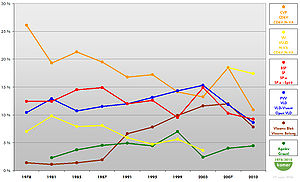- Christen-Democratisch en Vlaams
-
Christen-Democratisch en Vlaams 
Leader Wouter Beke Founded 2001 Preceded by CVP and CVP/PSC Headquarters national secretariat
rue de la Loi/Wetstraat 89 BrusselsIdeology Christian Democracy International affiliation Centrist Democrat International European affiliation European People's Party European Parliament Group European People's Party Official colours Orange, Yellow Walloon counterpart Humanist Democratic Centre German-speaking counterpart Christian Social Party Chamber of Representatives 17 / 150Senate 7 / 40Regional Parliament 31 / 124European Parliament 3 / 75Website www.cdenv.be Politics of Belgium
Political parties
ElectionsThe Christian Democratic and Flemish (Dutch:
 Christen-Democratisch en Vlaams (help·info), CD&V) is a political party of Belgium, formerly called Christian People's Party (Christelijke Volkspartij, CVP). It is a centre-right Flemish party committed to Christian democracy, with historic ties to both labour unionism (ACV) and corporative organisation as Unizo and the Farmer's League.
Christen-Democratisch en Vlaams (help·info), CD&V) is a political party of Belgium, formerly called Christian People's Party (Christelijke Volkspartij, CVP). It is a centre-right Flemish party committed to Christian democracy, with historic ties to both labour unionism (ACV) and corporative organisation as Unizo and the Farmer's League.As of the 2007 elections, it formed the largest political formation in Belgium until the 2010 elections, which led to a major loss. Currently, CD&V is a major member of the Flemish Government led by Kris Peeters.
Contents
History
The history of the CD&V dates back to the 19th century. It originated in the 19th century catholic party, or 'parti conservateur' (conservative party). At the end of the century, the new fraction of the so-called christian-democrats shifted the focus of the party slightly to the left. In the interwar years the party was renamed Catholic Block. Then, the Christian Social Party (PSC-CVP) existed from 1944 until 1968. In 1968, the PSC-CVP was split into to the (Walloon) PSC (now Humanist Democratic Centre) and (Flemish) CVP. In 1999 the CVP became the CD&V.
The party was almost continually in power from its establishment until 1999. From 2003 it has been led by Yves Leterme, and before that was led by Stefaan De Clerck. Now it is led by Jo Vandeurzen. Despite its optimistic predictions, it came third in the 2003 elections, coming behind the Flemish Liberals and Democrats (VLD) and the SP.A-Spirit cartel. Much of its predominantly rural support was taken by the nationalist party Vlaams Blok.
CD&V led the opposition to VLD prime minister Guy Verhofstadt who had formed a center-left coalition between liberals, socialists and greens in 1999 on the federal and Flemish Government level. In 2003 CD&V again lost the federal elections which continuated the federal center-left coalition, but this time without the Greens. On 13 June 2004 Flemish elections were held alongside European elections. CD&V led by Yves Leterme won these elections, partly by forming a cartel with the moderate nationalist N-VA, and retook its historic position as largest party in Flanders. On the 20th of July 2004 Yves Leterme presented the new Flemish Government and was sworn into office as the new Minister-President of Flanders. He negotiated a coalition of VLD, SP.A-Spirit and CD&V/N-VA.
Recent developments
2007 elections
Although unwilling to state clearly his position as aspiring prime minister of Belgium, Leterme led the Senate list for the CD&V/New-Flemish Alliance (N-VA) electoral pact in the 2007 elections. In the 10 June 2007 general elections, the cartel won 30 out of 150 seats in the Chamber of Representatives and 9 out of 40 seats in the Senate.
Having become the largest political formation as a result of these elections, the CD&V looked to lead the subsequent coalition talks, which repeatedly stalled (see 2007–2008 Belgian government formation). On the 20 March 2008, a new federal government was finally assembled.
2010 elections
After the break-up of the cartel with the N-VA in 2008, CD&V chose to keep the coalition government running without them to face the problems of the international economic and financial crisis. Furthermore, in 2010 the government wasn't able to solve the issue of Brussels-Halle-Vilvoorde, which led to the decision of the Flemish Liberals and Democrats to step out of the coalition and consequently ending the government. The federal elections of 2010 resulted in a major loss of historic proportions for CD&V, largely due to votes lost to the New-Flemish Alliance. In the campaign, former prime minister Yves Leterme took a subtle step aside as frontrunner of the party. The president of the party, Marianne Thyssen, had pre-electorally stated that she was a candidate to become prime minister.
Electoral results (1971-2010)
Results for the Chamber of Representatives, in percentages for the Kingdom of Belgium.

- CD&V in coalition with N-VA
Presidents
CVP/PSC
- 1945-1947 Gilbert Mullie
- 1947-1949 Paul Willem Segers
- 1949-1959 Jef De Schuyffeleer
- 1959-1961 Fred Bertrand
- 1961-1963 Jozef De Saeger
- 1963-1968 Robert Vandekerckhove
CVP
- 1968-1972 Robert Vandekerckhove
- 1972-1979 Wilfried Martens
- 1979-1982 Leo Tindemans
- 1982-1988 Frank Swaelen
- 1988-1993 Herman Van Rompuy
- 1993-1996 Johan Van Hecke
- 1996-1999 Marc Van Peel
- 1999-2001 Stefaan De Clerck
CD&V
Part of a series on Christian democracy Politics portal - 2001-2003 Stefaan De Clerck
- 2003-2004 Yves Leterme
- 2004-2007 Jo Vandeurzen
- 2007-2008 Etienne Schouppe
- 2008-2008 Wouter Beke
- 2008-2010 Marianne Thyssen
- 2010-present Wouter Beke
Until 1968 this lists gives the president of the Flemish part of the unitary CVP/PSC. The party changed its name from CVP to CD&V on 29 September 2001.
See also
References
- Th. Luykx and M. Platel, Politieke geschiedenis van België, 2 vol., Kluwer, 1985
- E. Witte, J. Craeybeckx en A. Meynen, Politieke geschiedenis van België, Standaard, 1997
External links
 Political parties in Belgium
Political parties in BelgiumFlemish parties Christian Democratic and Flemish · Flemish Interest · Flemish Liberals and Democrats · Green! · Libertarian, Direct, Democratic · New Flemish Alliance · Socialist Party – Differently · VLOTTFrancophone parties Ecolo · Francophone Democratic Federalists · Humanist Democratic Centre · National Front · People's Party · Reformist Movement (component parties: Citizens' Movement for Change) · Socialist Party · Walloon RallyGerman parties Christian Social Party · Party for Freedom and Progress (component party of the francophone MR) · ProDG · Socialist Party (component party of the francophone PS)Pan-Belgian Portal:Politics - List of political parties - Politics of Belgium Categories:- Catholic political parties
- Belgian political parties-Flanders
- Christian democratic parties
- Political parties established in 1945
Wikimedia Foundation. 2010.

